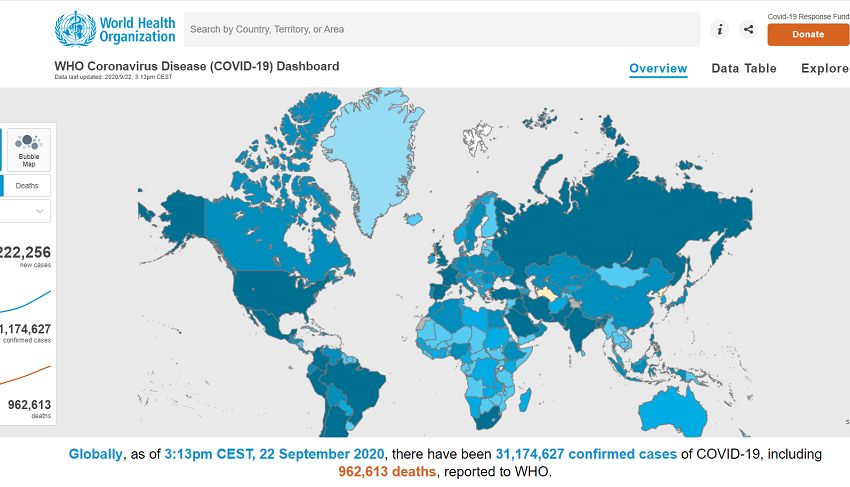SPONSOR
The importance of data in the fight against Covid-19
By Amazon Web Services
Healthcare institutions around the globe are using data to design better pandemic responses and train frontline staff.

Leaders need accurate data to design effective countermeasures for the pandemic. With the massive volumes of data being produced daily, healthcare professionals and policymakers need to cut through the noise to find useful and credible sources.
AWS has enabled governments and healthcare leaders to make the most of all the data out there. We look at how healthcare organisations around the world have improved their pandemic response with data.
Design better responses
As countries experiment with ways to limit the spread of Covid-19, they will need feedback on how well different preventive actions work. Data can help.
WHO has built a Covid-19 interactive map that provides daily updates on the number of cases in each country and around the world. The dashboard uses AWS services to automatically extract web content, analyse and process the data, and store large amounts of unstructured information. This allows WHO to share crucial epidemiological data with staff, Member States and healthcare organisations around the world in a timely way.
AWS is also supporting national efforts to measure the effectiveness of counter-Covid initiatives. US healthtech company Kinsa has built a map of potential hotspots using real time fever and symptom information from more than one million of its internet-connected thermometers. The map also helps health officials assess the impact of social distancing measures.
Hospitals in Brazil use information from a virtual screening website to predict the demand for Covid-related intensive care. It also informs potential patients about Covid-19 symptoms and advises on when patient should seek treatment.
Train healthcare professionals
Healthcare workers need accurate, reliable and up-to-date information to care for and treat patients effectively. WHO has built an app that allows health workers from all over the world to access its growing repository of Covid-related knowledge.
The app offers learning materials on topics including how to protect health workers, how the disease is spreading internationally, and how to communicate the risk effectively to the public. It even provides virtual skills workshops that can help to train healthcare professionals.
AWS provided free hosting services to help WHO Academy launch the app. The app is available for free on the Apple App Store and Google Play Store in seven languages, so healthcare professionals from all over the world can access information to improve their skills.
WHO also has an interactive online platform, OpenWHO, that provides free training courses for public health emergencies, including Ebola, cholera, and of course, Covid-19. The platform aims to equip frontline healthcare staff with essential knowledge for outbreak response. It offers courses on communicating risk, and how to assess the risk of mass gatherings to help with public health planning.
Public health emergencies often cross linguistic boundaries. While WHO has quickly made courses relating to the Covid-19 available, the challenge remains to make the content—primarily video—available to more users by offering it in multiple languages.
AWS is working on providing machine learning and media services to translate the content accurately in less time. With AWS’s support, WHO will be able to translate each piece of content in a few hours, instead of a few days.
How AI can help
Medical professionals need a way to find the ground truths buried amidst rumours and misinformation. Imperial College London aimed to solve this by creating a global knowledge platform that will save time on manual research and analysis.
This platform, known as REDASA (REaltime Data Analysis and Synthesis), uses AWS machine learning services to analyse large volumes of information, including medical journals, healthcare literature and news sources, in real time.
This helps clinicians and policymakers to find the best available evidence for better patient treatments quickly, as data analysis takes minutes instead of days. The team was also able to build the platform four or five times quicker.
All insights from the platform are backed by human expertise. The analysis is curated and confirmed by medical professionals, so they can be shared with other experts reliably.
AI can also help to comb through reams of data to sieve out helpful facts from distracting misinformation. AWS is helping WHO to build a tool that will classify large volumes of Covid-19-related content more effectively for the Epidemic Intelligence from Open Sources initiative, its global early warning system for potential public health threats.
This system looks at publicly available information, including news articles and reports, to detect and assess potential public health threats. The tool will use machine learning to identify the tone of a piece of content, and decide if it is credible information. This will help experts distinguish rumours or intentional misinformation from credible information more easily.
Data has become indispensable as clinicians and policymakers suit up for the fight against the pandemic. Tech can help to not only process that data more quickly, but identify the most truthful sources as well.
Image from WHO Coronavirus Disease (COVID-19) Dashboard.